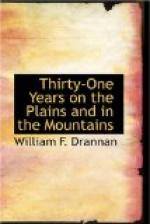On my return Col. Elliott told me not to leave the camp so far any more, for, said he, “I am satisfied if you had been here we would not have had the surprise.”
I told the Colonel what kind of country we would have for the next seventy-five miles; plenty of water and grass, abundance of game and the country full of hostile Indians.
The reader will understand that this was the year 1856. The Klamath Indians and the tribe afterwards known as the Modocs, of whom mention will be made later on in this work, were one and the same tribe; and up to this time they did not know what it was to be whipped. Besides there had been but little travel through this part of the country without experiencing a great deal of trouble with those Indians.
CHAPTER XVI.
More fish than I had ever seen at one time.—We surprise some Indians, who also surprise us.—The camp at Klamath lake.—I get another wound and A lot of horses.
When we pulled out for Klamath Lake we traveled from five to ten miles a day and kept scouts out in all directions. While riding along one day with my four assistants, a few miles in advance of the command, we came to a beautiful body of water which is now known as Clear Lake, which is the head of Lost river. Here we dismounted, and on looking into a brush shanty that stood on the lake shore, I saw more fish than I had ever seen before at one time. The little shanty was filled to its utmost capacity with fish, hanging there to dry for winter use. Further on we found numerous other similar shanties, all containing like quantities of drying fish. These were the Indians’ dry-houses. They had caught the fish and hung them there to dry in the hot summer’s sun. Such was their food in winter when the land game was scarce.
After our fill of admiring the beautiful lake and resting our horses, we mounted and started back to the command. We had gone only a short distance, when, all of a sudden, on reaching the top of a little hill, we were met by twelve Indians, who had not seen us, nor us them, until within a hundred yards of each other.
There was only one thing to do and that was to fight, for they were directly between us and the command, and the braver we were I thought the better; so I gave orders to charge, but the Indians did not stand fire. We got three of them that first round and in another hundred yards we got three more, but their horses being fresh and ours somewhat jaded, they outran us and got away.
These were the first Klamath Indians I had got close enough to, to see how their moccasins were made, and for a person engaged in the business that I was then in, it was quite essential to be able to tell the tribe an Indian belonged to by his track. And here I will state that not any two tribes cut and make their moccasins alike and at that time I could tell an Indian by his track, if he belonged to any tribe that I was familiar with.




